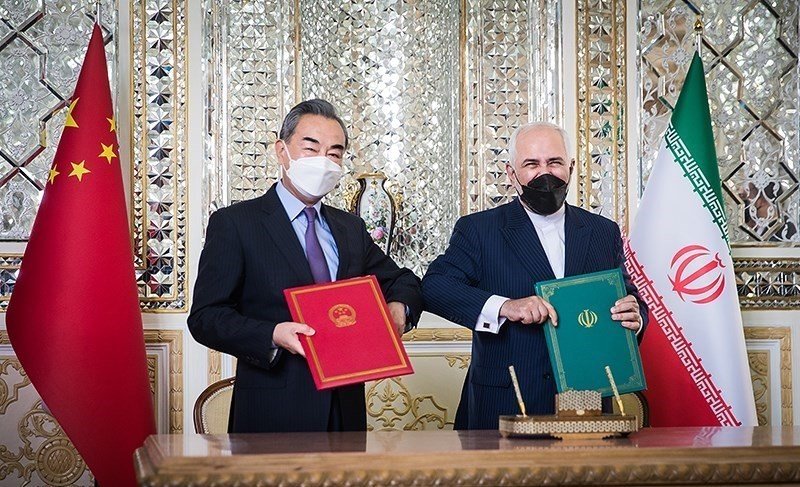The Cold War is re-emerging in the Middle East
Like the tremendous labor pains that produced the birth of the modern-day Jewish state of Israel in 1948, this week’s Yom Ha’atzmaut is a particularly bittersweet one. There is a tremendous amount of hope swelling from Israel’s new friends from the Gulf States, yet the dangers that have aligned seem nearly monumental.
As I began writing these words, US special envoy to Iran Robert Malley was in Vienna trying desperately to engage directly with the Iranians. The Iranians are great psychologists and have refused to sit in the same room with the Americans. Instead, representatives of Britain, France, Germany, Russia and China were acting as intermediaries. The United States has been reduced to the little boy who has been left out of a party with his nose pressed against the windowpane, desperate to be let in.
Predictably, State Department spokesman Ned Price said that the United States “is prepared to lift sanctions on Iran to resume compliance with the Iranian nuclear deal.”
One cannot turn back the clock to 2015. According to the International Atomic Energy Administration, the amount of highly enriched uranium in Iran’s possession is more than 10 times that which was allowed under the Joint Comprehensive Plan of Action (JCPOA). Since the signing of that nuclear deal, Iran has been developing a sophisticated ballistic-missile program that poses an enormous threat to Israel, the Middle East as a whole and the United States. It has tested those missiles at least 30 times. They have the material, and they have the delivery mechanism.
While our State Department is beseeching the Iranian regime with greater offers to simply allow us into the room, the Iranians have already brokered a $400 billion, 25-year military, defense and intelligence deal with Beijing. The ramifications of this huge sum of money are nothing short of terrifying.
For the Chinese, it is a zero-sum game. They, as well as the Russians, are still fighting the Cold War. They see the Middle East as an essential arena in their ambitious “Belt and Road” strategy. They are seeking oil to fuel their rapidly growing population and economy, and to become a world dominant power. As for the Iranians, whose economy has been significantly impacted by US sanctions, they see this as a quick and steady source of cash infusion. And, of course, they share a common enemy: America.
The Russians also seem determined to resurrect the Cold War. They, as well as their Chinese “frenemies,” see America’s retreat from the region as an opportunity to swoop in, fill the void and flex their muscles. In an alliance with Iran and their proxy, Hezbollah, the Russians have maintained a presence in Syria since September of 2015 and helped resuscitate the often moribund dictatorship of Bashar Assad.
A very troubling story on April 6 in the Lebanese-based Al Akhbar news states that Russia has spoken with Hezbollah leaders and has asked them to remain in Syria. According to this report, the Hezbollah delegation’s visit to Moscow last month, headed by Mohammad Raad, member of the Shura Council, was told that “in Moscow, Hezbollah’s military performance is highly respected — its professionalism, discipline and ability of its fighters to achieve its goals,” as is its “pragmatism.”
The author added: “Russian officials were keen to deliver a clear message to Hezbollah leadership: Your presence in Syria is necessary, in politics, in the military. We count on you in the future in both fields,” and spoke of an appreciation of Hezbollah’s presence in Yemen, Iraq and other countries in the region, and discussed the possibility of Hezbollah opening an office in Moscow.
Iran, Russia and China are intent on resurrecting the Cold War in the Middle East. While we are groveling to be let into the room with the Iranians, they are all enjoying a hearty laugh at how short a time it has taken to reduce the Biden administration to this state of obsequiousness. It is akin to arguing over the rules of shuffleboard on the deck of the Titanic.
On Sunday, it was probably the Israelis who didn’t wait for the ship they are sailing to go, full steam ahead, into the iceberg. It knows that no one else will have the courage to do what has to be done to set back this major existential threat. So they were the ones who probably struck at Iran’s Natanz nuclear facility, setting back production by about nine months.
By so doing, tiny, dauntless Israel is protecting not only itself, but Europe, the Arab Gulf countries and the United States as well. Already, Jerusalem is tacitly being blamed in Vienna by the European Union for “attempts to derail the talks.”
Israel has grown in so many ways — in military power, commerce, technology and medicine since it was a fledgling little state in 1948. However, the almost daunting challenges remain.
Sarah N. Stern is founder and president of the Endowment for Middle East Truth (EMET), a pro-Israel and pro-American think tank and policy institute in Washington.

 47.0°,
Mostly Cloudy
47.0°,
Mostly Cloudy 








